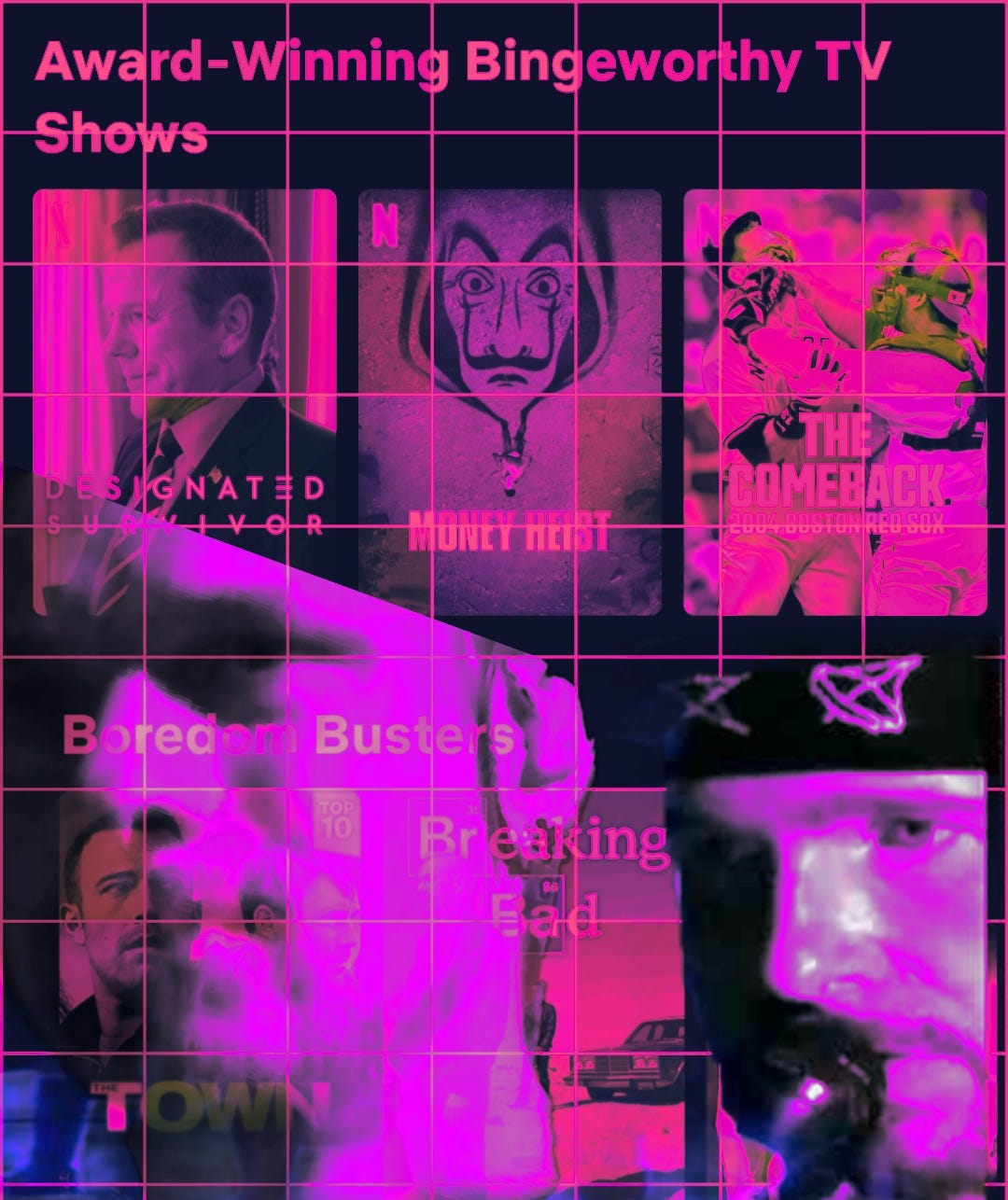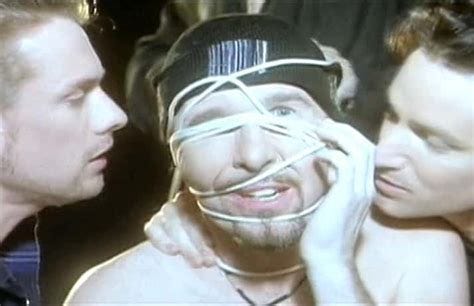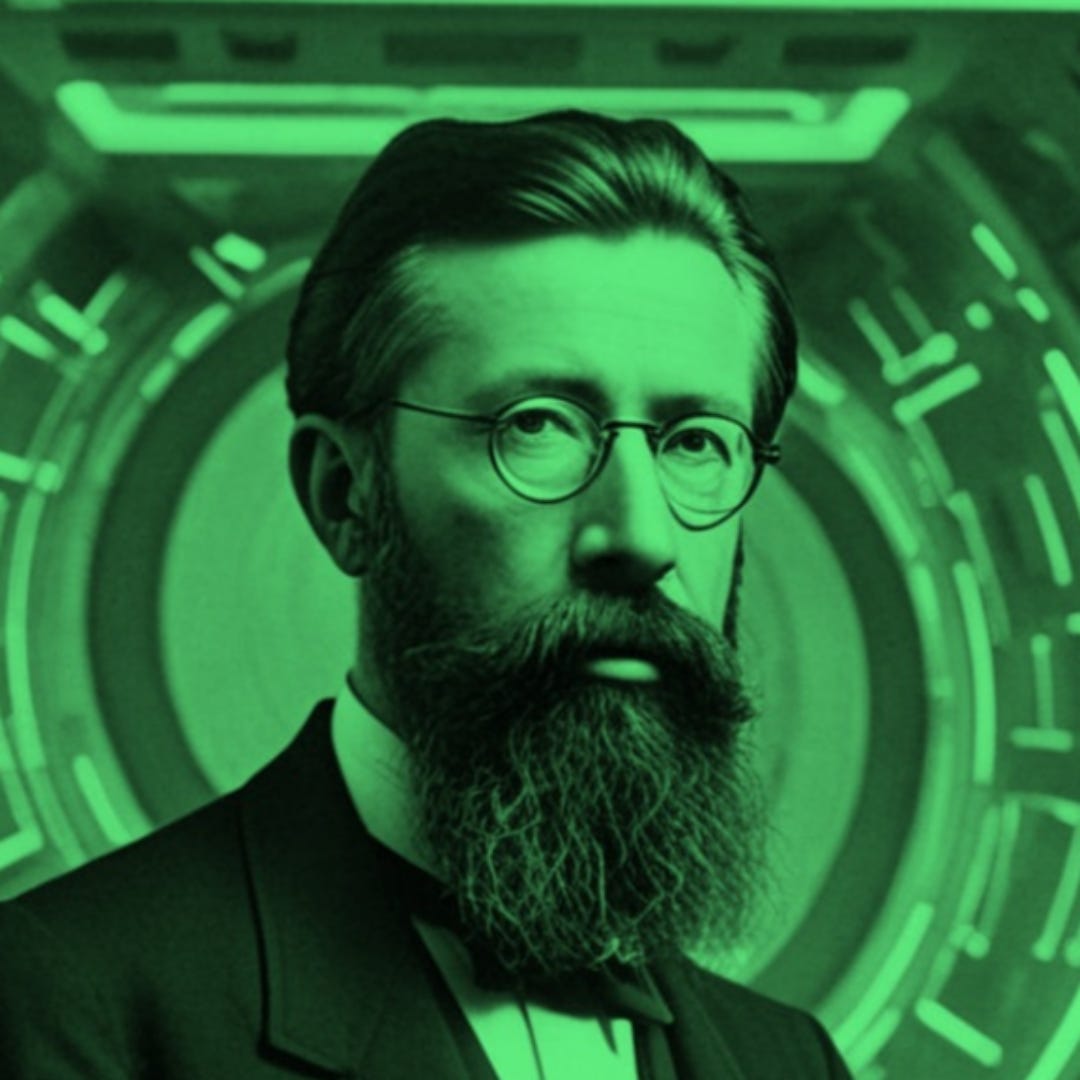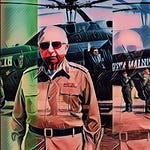This episode is an intersection between art and political life.
It is also an intersection of our material and spiritual lives within the context of a society so interwoven and interconnected by the forces of technology that they have redirected our priorities so vastly that the state of our autonomy as individuals is in complete disarray, and the "capital-"S" State itself has been given the signal to take over our family lives (if not our very souls) where we have blatantly neglected them.
Time Stamps:
Welcome to ZOO-TV (0:00)
Let's Go to the Overground (9:44)
Don't Fall on Your Sword (12:42)
Zooropa (15:36)
Babyface (18:32)
Numb (20:45)
Lemon (24:48)
Stay (Faraway, So Close!) (28:52)
Daddy's Gonna Pay For Your Crashed Car (30:59)
Some Days Are Better Than Others (35:42)
The First Time (37:33)
Dirty Day (40:38)
The Wanderer (42:46)
Under An Atomic Sky (50:18)
And I have no compass / And I have no map / And I have no reasons / No reasons to get back / And I have no religion / And I don't know what's what / And I don't know the limit / The limit of what we've got
This is admittedly a dark assertion that demands a convincing illustration. I accept this as my task today, come what may. I run the risk of an embarrassing flop of an attempt to justify a heavy assertion, but if I fail, the purest intentions and the entertainment value will be worth the embarrassment.
Little did I realize that this episode was decades in the making until the connections were finally realized: this hits hard on the recurring themes of The Jipshow. Either "dream out loud" in your own world or finally acknowledge that this is an episode that must be made.
There will be religious themes explored in this episode, and the Bible will be referenced. However one holds the topic of faith and organized religion, embrace it accordingly, whether it is held vital or simply helpful metaphorically. In either case, it will prove beneficial. The wisdom of the Bible serves as an instrument and a guiding light as we conceptualize this warning and lamentation.
After observing the sea change in light of Brexit, along with Donald Trump and an international rise of the populist right as a political force, U2 set aside the release of their album Songs of Experience and focused instead on reconnecting themselves and their fanbase with their 1987 masterpiece, The Joshua Tree, which they believed (so goes the story) to be far more relevant for the time. They devoted a stadium world tour to The Joshua Tree, playing the album in full, and warned the United States against Donald Trump's agenda.
While this may have been sincere enough from U2's own vantage point, we contend that Zooropa is actually a far more significant work to consider for our time, in light of a powerful tech industry asserting itself (at the FBI's command, we'd later find out) over our electoral outcomes.
I fully understand the ironies, and how ridiculous it may seem. A Eurocentric album from 1993 by a band that's become known for digitally trespassing, as opposed to the America-focused Joshua Tree with the band seemingly in its most direct and earnest phase of its career.
But let's prove irony as merely a mask going forward.
In 1850, French economist Frederic Bastiat wrote his famous essay, “That Which Is Seen, and That Which Is Not Seen.” It features the Parable of the Broken Window to explain how opportunity costs, wasted resources, and unintended consequences affect our lives. It also warns us that ill-conceived trial, error, and repair represent a social and personal loss insofar as resources and human effort are concerned.
By the early 1980s, American social scientists James Q. Wilson and George L. Kelling contributed observations that were unseen to Bastiat himself with what criminology now recognizes as the Broken Windows Theory. In short, the idea is that - like a broken window - a degraded environment invites more degradation to take shape.
A concept album with a confrontational message is similar enough in that we may call it “That Which is Heard, and That Which is Not Heard.” As a good economist knows to weigh both things seen and unseen, a good listener will consider That Which is Not Heard, even after becoming familiar with the material, or even having the lyrics memorized. Just as songs are “never finished,” they are “never fully understood,” either. But time - and paradoxically, technology itself - may prove to be a great help.
The confrontation on Zooropa differs sharply in tone and style from the war-sick “Sunday Bloody Sunday” and the restless spiritual yearnings of “I Still Haven't Found What I'm Looking For.” Instead, there is a playful darkness that leads to its more serious moments. Musically, each song seems headed in a different direction. Thematically, however, there's a commentary that flows from one track to the next. It tells a disturbing story: our story.
This analysis is not a critique of a "free market." Quite the contrary. It's a critique of a corporate-driven, tech-obsessed world that "serves its customers" from the top down and thereby thinks nothing of the harm its social arrangement, in all its traps set for the consumers they are supposed to serve in good faith. Here, we seek to explore the undertones of the Overground.
With that said, this is also not a critique of technology itself, but one that will certainly address the dangers of social and spiritual immaturity, and the problems that manifest when they are met with the comfort and authority delegated by modern technology. When man asserts dominion while falling trap to a slew of vices, addictions, and misplaced priorities, perhaps it's clear that he's ultimately unqualified to retain the dominion in question. We have underlying weaknesses that are revealed when we carelessly seek “information super-highways” with no proper limits.
For an extreme example, let us consider the advent and continuation of nuclear weapons. Nations that once put their most dangerous weapons into conflict had to choose whether to use a completely novel level of restraint or to risk human extinction. This prospect has not disappeared.
Let us now return to the topic at hand: our addiction to all things Big Tech.
Or as a term of derision I'd rather interchangeably dub, “Nephilim Tech.”
Implicit from here on out will be whether a decentralized, tech-when-necessary approach both to individual consumption and to a social vision is to be preferred instead.
Let's Go to the Overground
A few years ago, cultural critic Steven Hyden observes that as an album, Zooropa's "version of the future makes a lot more sense in 2023 than it did in 1993." Give a futuristic work of art 30 years, and life itself undoubtedly begins to imitate it.
This obscure album will serve as our point of reference. It was originally written and recorded to accompany U2's iconic ZOO-TV world tour, which continues to influence state-of-the-art rock shows, and quite possibly, even the bombastic screenshow of Times Square by extention. Just a thought.
The band had reportedly intended to release an EP, but bid for a full-length album in a burst of inspiration. I nevertheless assert that Zooropa is a concept album, warning us about the excesses of technology. Perhaps this bears a definition: technological stimulus to the extent in which boredom is replaced with a state of numbness.
Zooropa delivers the sounds of science fiction, even at times nearly driving music itself away from the record. Heavily influenced by electronica, featuring "ridiculous voices," and guitar work so heavily processed into effects pedals that one can hardly identify the instrument of origin. The Edge's philosophy of "expensive notes" match Bono's mysterious imagination, giving birth to an album that baffled fans and critics alike.
But again, a work that confused an audience who thought they understood the band U2 - back in the 1980s, when even "Sunday Bloody Sunday" was wildly misinterpreted by its critics - seemed convinced that the band were having too much fun playing on irony and pretentious rock stardom to offer any message of meaning any longer. But to the contrary, the track listing is intentional, as is the storyline it seeks to convey to an attentive listener.
This analysis is my own, as are the interpretations of each of these songs.
In addition to the band's own insights, I have benefited from various helpful interpretations over the years, but have no way how to attribute credit to the "randos" who have contributed in various places on the internet. This is a paradoxical "thank you," wherever it belongs.
We should realize that perhaps some listeners are eager for a mention of U2's own infamous infraction when their Songs of Innocence album showed up on every Apple device without solicitation or consent. It's relevant to mention and acknowledge briefly, and there's plenty that a critic can take away both from that incident and the insights I wish to provide relating to Zooropa and the tech-absorbed world we find ourselves in, even as fairly modern reviews of the album aren't sure what to make of it.
As for the Apple incident - enabled by our very target - Bono has since apologized after witnessing the backlash.
I take full responsibility... Mea culpa.
With that brief address, let us focus on the intended topic as I have presented it.
Don't Fall on Your Sword
Today, we invite governments and corporations into our living rooms in a way that compares to George Orwell's masterpiece, 1984.
But at the risk of butchering dramatic effect itself, the 1993 album Zooropa by U2 was strongly influenced by William Gibson's 1983 science fiction classic dystopia, Neuromancer, in which the overarching futuristic culprit is not a boot to the face, but the seduction of technology, which for all of its glory, tends to undermine our self control, therefore our autonomy, making way for governments and corporations to take over with yet more of their own ideas in controlling our lives.
It's often convenient to blame governments and corporations for the problems they undoubtedly create, and argue all day whether it's one or the other in any given social ill. But our argument here digs at the core, and asks: what is our own culpability, and have we been caught bare before a serpent, giving into a temptation that we've been forewarned against?
By the turn of the century, Bono was fond of telling listeners to "turn this song into a prayer." But in the 1990s, he went with a different spiritual motto: "mock the Devil and he will flee from thee." It's a playful quotation to be sure, but it's doubtful that even Bono ever seriously believed his own motto if one accounts for U2's Zooropa album on any serious level.
Throughout the course of lyrical analysis, I did use some of the very tools I will criticize - implicitly or otherwise - one of which is the Google search engine. Another was Spotify. Several of the songs were marked “Explicit” due to their subject matter, although they lacked direct use of profanity and addressed sexuality implicitly, even if the suggestions were strong once recognized. Similar to Jim Morrison's own quotation, I offer yet another paradox: all music is spiritual, and all lyrics are explicit.
As we step foot into this album, we are chillingly reminded of the biblical passage of Luke 9:25: For what profit is it to a man if he gains the whole world, and is himself destroyed or lost?
"Zooropa"
On Wikipedia's entry for the song "Zooropa" is the following synopsis, condensed for our convenience:
"The lyrics were written by lead vocalist Bono describe two characters in a brightly lit city in a futuristic version of European society... The song touched on several themes, including moral confusion and the future of European society."
Our critique speaks for itself in that we are not discussing a problem that's in any way confined to "European society." You may not even need to leave your own home to see the nearest person vanish into a digital landscape, lusting after a dopamine hit and seeking closer digital connections, represented not by a ring or even so much as a beer, but for as cheap as a "like" react.
Simultaneously, people as a collective become advertisements for data-driven enterprise, while personally advertising themselves, their lives, their thoughts. Perhaps we can all plead guilty, but it's nevertheless constructive to reflect.
The theme of moral confusion and uncertainty present themselves throughout the song's lyrics. From the very beginning, you receive a message to embrace the miracle of consumerism to heal your boredom, nihilism, and despair.
Although some of the advertising slogans are recognized from a European point of view, the American audience may as well hear "we love to see you smile" and "diamonds are a girl's best friend."
What we find in the lyrics is a conversation between the priesthood of this tech-focused Overground and the subjects it seeks to attract, promising to elevate their lives and view uncertainty as a guiding light, even one that would give them a world they dream to live in.
Bono describes the theme as follows:
There's this image of the 'overground'. It was a time when everyone was all indie and grey and dull—the 'underground'. The overground was like coming out into the bright light of a modern city. It's an amazing place to be, walking around these modern cities like Houston or Tokyo. And the idea was coming out into that, embracing it, going after it.
Should we embrace this "Overground," let us for the moment put our criticisms to rest.
"Babyface"
The Overground is already getting dark, but we'd never know it from the toy piano that opens and accompanies this tune, or the deceptively soulful chorus, sung as a man swept off his feet over a woman who's flattered to hear it.
In the song "Babyface," the protagonist adores the woman he sees on the TV. With today's tracking capabilities, you can only imagine his recommendations when you hear a lyric like this to describe her eyes:
I've seen them so many times
I feel like I must be your best friend
It doesn't take long at all for technology to seduce this man into an obsessive fantasy world, where he's literally "checking out every frame," under the spooky impression, as the song also says, with the remote, he's got it "under my control.” She's a “bittersweet girl,” but he's not concerned in the least. Is she trapped in a career with drawbacks such as this? The man couldn't care less.
Imagine Fifty Shades of Gray, and he's "checking out every frame." He even adores her “tin foil hair.” By the end of the story, we will have more to say about the “tin” of the Overground, but I digress.
He calls himself “an ordinary guy,” but has nothing better to do than fixate and fantasize nonstop over a Hollywood actress.
He is exploited as a consumer, but apparently loves it. The object of his affection is grossly exploited as an actress, but also apparently agrees to those terms, “bittersweet” she may be. Presumably, she must ignore how “ordinary” men are responding to her.
"Numb"
Perhaps the most memorable tune from the Zooropa album is "Numb," featuring The Edge on lead vocals. Larry Mullen Jr. provides a militaristic drum beat, while the Edge strums a simple chord progression with a thick, buzzy flanger guitar effect. Sounds of teeth being pulled can be heard in various parts of the song. There are plenty of bombarding sounds packed in to deliver a fittingly numb feeling to the listener.
The song was originally released exclusively as a VHS single. The music video features The Edge being subjected to a variety of strange interactions: getting tied up, having cigarette smoke blown in his face, getting his shoulders rubbed, having his beater top snipped off, getting slapped, and having a belly dancer show up (his eventual wife, Morleigh Steinberg).
Instead of singing, The Edge is mumbling a long set of commands to the listener.
Don't move, don't talk out of time
Don't think, don't worry
Everything's just fine, just fine
A standout command is, "don't try to make sense."
The same band that spent the 1980s challenging the music scene with deeply meaningful lyrics and a restless hunger for answers is now supposedly throwing in the towel.
That is, if the song is to stand on its own, instead of serving a place in a much broader context and storyline, which is our argument. The Zooropa album is a concept, and going numb to the excessive engagement with technology is where we are in a world that promised so much to cure our boredom. In effect, Big Tech has promised us the whole world at the price of a human soul.
The Edge, in monotonous mumbling - and Bono, in his "fat lady" falsetto - are having a conversation throughout. "Everything's just fine... don't fall on your sword..." In short, don't adopt any other values than whatever it takes to kill off your boredom. Or as Qanon put it, "trust the plan,” and one we've previously tackled, “no questions asked.”
Missing in this conversation, but a haunting line later in the song "Dirty Day," is "where you aim, you just might hit."
Let us take that as a foreshadowing now instead of simply a reflection once we reach an endpoint down this road to Nephalim Tech serfdom.
The advertising slogans of “Zooropa” aren't even necessary at this point. Whatever the “aim” once was, Nephilim Tech has now created a society full of addicts who are easily seduced by their next big thing.
Essentially, the message now in “Numb” is, "don't question the social contract of this Brave New World. "
The Edge is aiming his subject to put a numbing addiction to Big Tech ahead of all else, as though he is a mumbling demon of the age, reciting its constitution and customs.
And when it comes to our addiction to everything Nephilim Tech offers us, "too much is not enough."
"Lemon"
It's relevant to point out that the song "Lemon" was only performed live with Bono dressed in the character of Mr. MacPhisto, a satirical composite of a washed-up rock star and the devil himself.
[The devilish persona even caught the attention of 60 Minutes Australia.
Play Bono Clip on MacPhisto]
Without a hint of regret, the lyrics of “Lemon” allude to a post-Christian society where Friedrich Nietsche's terrifying "God is dead" proclamation is supposedly solved at last by a woman's seduction, which gives man a reason to live. Bono delivers the lyrics in falsetto, which executes the aim of seducing the listener with a sexy tune and a dark tell to sneak in.
She's gonna make you cry
She's gonna make you whisper and moan
And when you're dry
She draws water from the stone
Pause button.
Who else famously drew water from a stone?
Moses.
In Moses' case, the rock was what supplied the Jews with water. In a notorious moment of frustration, Moses struck the rock. After this incident, Moses and the Jews wandered in the desert for 40 years.
Let that be a hint for Zooropa's final track, "The Wanderer," as sung by the late Johnny Cash.
“Lemon” continues.
"Midnight is where the day begins" is repeated in the chorus. It's a true statement, but perhaps a bad decision to take literally, as though one should wake up at midnight and begin each day partying in the nightlife.
All the trouble you can find until the next midnight out.
I must confess that I misheard a lyric for a long time as "these are the days when our work is done on Sunday." And yet, even mishearing it helped to shape my view that it addresses a post-Christian society in some way.
And these are the days
When our work has come asunder
And these are the days
When we look for something other
They "look for something other" than the Joshua Tree sound, and the naked earnestness of that whole era? Work "come asunder" in that their work environment as a band is more fragmented?
Or is this Overground society looking for something other than God, family, and responsibility? If that's the true subtext, you can imagine where this is going.
To further foreshadow the storyline, let's bookmark a few scattered lyrics as a reference point for the very near future:
Man makes a car... but he always stays behind.
"Stay (Faraway, So Close!)”
In our interpretation of the sequence, we are given a break from a seductive demonic figure - perhaps Satan himself - and now have a story told by an angel.
But this angelic figure seems powerless.
He nevertheless wants the woman in the story to be saved, even as she's wrecking her life away (and her car, for that matter).
As the opening verses inform us, the woman doesn't smoke, and doesn't even want to. Yet, she heads for 7/11 to purchase a pack of cigarettes.
So, what's going on?
It seems she has a dangerous man in her life. Worse yet, she seems to enjoy the pain in her life far too much to leave it behind:
You say when he hits you, you don't mind
Because when he hurts you, you feel alive
She is lost to the point where the angel doesn't even feel he exists.
And if you look, you look through me
And when you talk, you talk at me
And when I touch you, you don't feel a thing
She's grown numb, too. The angel is worn out from whatever protective duty he has been given. She has excused the pain this man inflicts upon her to the point where even an angel couldn't help her.
As the song ends:
Just the bang and the clatter
As an angel hits the ground
The storyteller may be an angel, but the song feels particularly dark. You almost miss the Devil's comforting lies.
"Daddy's Gonna Pay For Your Crashed Car"
Finally, we get another upbeat groove.
One small problem: the Devil is back.
Whenever performed live, it was with Bono back in his Mr. MacPhisto persona (as shown above), playing the Devil to a crowd of tens of thousands.
[Here's a bit from his monologue…
PLAY CLIP]
It was a ridiculously delicious piece of theatrical performance art, with little confusion as to the messenger. Though playful on stage, it also served as a dark warning against a dangerous enabler.
The song is said to explore heroin abuse, enabled by this "Daddy" figure who refuses to allow the woman to suffer any consequence from her foolish decisions.
Daddy won't let you weep,
Daddy won't let you ache
Daddy gives you
As much as you can take
Furthermore:
A little uptight, you're a baby's fist
Butterfly kisses up an' down your wrist
If this is about the same woman who didn't even smoke at the beginning of "Stay," she's fallen a long way, if that verse is a reference to heroin abuse.
By the end of the song, every day is "alright" because "Daddy" is there to bail her out. "Daddy" is the man who "makes a car" in the song "Lemon," and "he always stays behind," once again, here, to pay for the crashed car.
In the live performance, Mr. MacPhisto throws money around in the form of physical currency. People love money, and the love of money is the root of all kinds of evil. The money-changers of old and the central banksters today love their power over money. And in view of today's disputes, there is little doubt that Mr. MacPhisto would love to see an enabler pay for a crashed car with a central bank digital currency.
After the song is finished in concert, Mr. MacPhisto makes a prank telephone call to a well-known celebrity or political figure. This would charm a stadium-filled crowd into playing along with the gag, though perhaps many would miss the underlying point that "Lemon" and "Daddy's Gonna Pay" are written from the perspective of an evil person (or being, if you will).
Let us suggest that the prank call foreshadows the telemarketing fiasco and eventually our email inboxes being filled with spam. Put down the phone, turn on the "smart TV," and they have a dozen recommendations set out for you, as though this "smart" device knows you as well as you know yourself.
No real human relationships have to exist for us to find ourselves bombarded by the vices that technology enables. Add up the time spent deleting junk mail, and your opportunity cost may well be your responsibility to yourself, your family, your health, and your spirit. It's as though Nephalim Tech has been brought to you by Mr. MacPhisto, himself.
"Some Days Are Better Than Others"
The level of conceptual weight seems to tone down in this song, as it is driven by little else but Adam Clayton's thick bass grooves and some unremarkable hat hits that keep the rhythm going. It may even sound like a forgettable filler tune thrown in to complete a full-length album. Yet, that might be a deceiving feeling.
Back is a powerless "good guy" taking in proverbial wisdom. Or is he really listening to this "voice?" Is he even "good?" Or have we met him? Perhaps he is destructive and powerful, like the very man we've heard about before.
Some days you hear a voice
Taking you to another place
Some days are better than others
It seems he's being called away from the life he's living, as it is ruining himself and the woman he's destroying.
But does he listen to this "voice?"
To answer the question we just posed, we have to consider the rest of the story, and it really doesn't look good.
Recall "Stay," when the angel bemoans his wasted efforts to speak to the woman.
And if you listen, I can't call
And if you jump, you just might fall
And if you shout, I'll only hear you
Now, perhaps, this same angel is struggling to call her man - an abuser and a dangerous enabler - out of darkness.
"The First Time"
This song first appears to be a beautiful tune about feeling loved. A lover, a brother, and a grateful recipient.
But Zooropa-era U2 never seemed content with leaving you off the hook with a sappy love song or ended anything with a mere token of gratitude. And the greatest clue is in the title, itself.
Towards the end, we find a sharp twist of the plot. A Christ figure - and let us boldly suggest it's Yahweh himself - offers the protagonist the Kingdom and its many mansions, but he "threw away the key."
He rejected paradise.
What happened?
The saying goes, “hurt people hurt people.”
How didn't he feel love until now, with “a lover like no other,” and a brother who spent all his time helping him? In reference to the lyrics, he's almost always feeling “down,” seeing no “colors.” Those who love him can never be loved back, because he's been too numb to actually feel it. Numb, maybe even to the point where he is inconsolable.
But only occasionally, he realizes he's “a brother in need.” His need is met, he presumes, when he receives his brother's attention. In the Sermon on the Mount, Jesus blesses the “poor in spirit” and “those who hunger and thirst for righteousness.”
Realizing one's own spiritual poverty is a key theme. And it's exactly what the “First Timer” appears to lack.
The song “Please,” later heard on the Pop album, delivers the memorable line, “love is not what you're thinkin' of.”
Did the protagonist have a distorted - perhaps, even downright perverted - view of love? Like the “ordinary guy” in “Babyface?” One "too good" for the reward offered by Christ, himself? Did he sell his soul to the world, the same world that almost never loved him back?
Within the song, we don't know why the “First Timer” felt unloved up until this point - or what pulled him away from a true Paradise - but should we reference most any other song on the album, we can infer that this Nephalim Tech society kept him away from fulfilling - or even recognizing - this most vital human need.
"Dirty Day"
This song features drum work reminiscent of “Babyface,” and let us ponder its intentionality. Instead of a twisted nursery lullaby groove, the textures are packed with haunting synthesizers. The tempo, however, is very similar. Even some of the melody seems to overlap. But this is no longer playfully dark, it's inconceivably tragic.
If our theory is correct, this is the same man who couldn't get enough of the Hollywood actress, now taking others into his twisted state of mind, wherever it may lead.
As the previous song, “The First Time,” has a protagonist who "threw away the key," this man walks away from his family and disowns his own son.
I don't know you
And you don't know the half of it
I had a starring role
I was the bad guy who walked out
Bono borrows a line from his own father to describe that the protagonist's view of love "won't last kissin' time." Bob Hewson would also use the term "dirty day."
Because the man no longer found "love" (in air quotes), he left his family behind to wander along somewhere else to seek it, perhaps hurting more women and abandoning yet more sons and daughters in the process.
Is this the same man who "threw away the key?"
Let us suppose that much.
The ending verse borrows from Charles Bukowski's poetry collection entitled, The Days Run Away Like Wild Horses Over the Hill.
"The Wanderer"
The closer of Zooropa begins with an organ-like synthesizer and a bass-driven beat. Perhaps intentionally, it's not the soothing church organ sound of "Where The Streets Have No Name," but a more downward, restless melody with a tense thumping rhythm.
Soon, the voice of Johnny Cash enters the room. We hear a man ready to repent for his own sins and find Jesus. He sees the wasteland around him for what it is, and he's lamenting "the tears when you said goodbye."
A confused listener may understandably mistaken this song for a modern-day hymn, but shortly, you will see the Devil in the details.
At the end of all this, we've lost our most meaningful relationships and found heartache. We've lost souls, but hopefully, We've found grace and redemption.
By the way, how's political life going at this point?
I went drifting through the capitals of tin
Where men can't walk or freely talk
And sons turn their fathers in
Whether by a political class or captains of industry is unspecified, and yet, the distinction is almost irrelevant at this point. Family life as we know it is destroyed by authoritarianism and the social neglect that preceded it.
Politics is downstream from culture.
And if you're hoping to pinpoint the first NAP violator at this point, let us borrow a stanza from “Dirty Day.”
If you need someone to blame
Throw a rock in the air
You'll hit someone guilty
And “capitals of tin.”
It sounds more like the Blikkiesdorp relocation center in Cape Town, South Africa that's considered a concentration camp by some of its own residents than a prosperity gospel brought to life.
Let's also take a sharp detour away from the idea that the Wanderer himself is as he appears.
Something doesn't quite fit.
In "The First Time," a cup of gold is mentioned. In "The Wanderer," there are "streets paved with gold... in a city without a soul."
Let's see if there's a connection as we unravel the protagonist.
For a "wanderer," this narrator seems enlightened as he observes:
I stopped outside a church house
Where the citizens like to sit
They say they want the kingdom
But they don't want God in it
Good preaching.
But those familiar with Bono and Johnny Cash can notice self-righteous preachers rightfully villainized in their work. Before Mr. MacPhisto had charmed the European audience, Bono embraced the “American” persona of Mirrorball Man, an egomaniacal televangelist who preached a prosperity gospel on steroids. (Shown below)
The song continues:
I went out walking with a bible and a gun
The word of God lay heavy on my heart
I was sure I was the one
Of all things, a gun. Why?
U2 is not suddenly embracing firearm ownership from an American “Second Amendment” perspective focused on self-defense. Johnny Cash is no stranger to telling musical stories from a perspective that may differ from his own, so long as it makes a point that matters.
This song is essentially "the new 'Exit.'"
If you recall "Exit" from The Joshua Tree, it was often introduced as a song "about a religious man who became a very dangerous man."
Long story short, stalker and murderer Robert John Bardo cited "Exit" as a motivation for murdering actress Rebecca Schaeffer in 1989, and the band refused to play the song live again for nearly 30 years.
From the chorus in “The Wanderer:”
Yeah, I left with nothin'
But the thought you'd be there too
If the "you" is Jesus, we have a deceived holy man who has been led astray as much as anyone else in the Overground. The Wanderer was sure he was “the one” to preach to the unwashed masses.
In Matthew 7:21, Jesus says:
Not everyone who says to me, ‘Lord, Lord,’ will enter the kingdom of heaven, but only the one who does the will of my Father who is in heaven.
Here, we have a Wanderer with the heart of Cain "looking for one good man," as though he is fit to do the Lord's work to save a modern-day Sodom and Gommorah.
Our theory is further vindicated by a lyrical shift in a live performance of the song where Bono sings:
I went out to bury my love
I promise I'll be back by noon
In Luke 9:59-60, the passage rings familiar:
He said to another man, “Follow me.”
But he replied, “Lord, first let me go and bury my father.”
Jesus said to him, “Let the dead bury their own dead, but you go and proclaim the kingdom of God.”
It seems this is the same man who "threw away the key" in "The First Time," and "was the bad guy who walked out" on his family in "Dirty Day." He may even be the creepy digital stalker in "Babyface," the deceiver in "Lemon," the abuser in "Stay," and ultimately, the enabling "Daddy" in "Daddy's Gonna Pay For Your Crashed Car."
But he hasn't changed. He's as deceived as he's ever been, and but a wolf in sheep's clothing by now. A Wanderer in the line of Cain.
Under An Atomic Sky
Well, that's a fairly convincing analysis of the Zooropa album, you might say. But what does this have to do with your case that we essentially have a dystopian Overground today, brought to us by Big Tech?
I have done several podcast episodes that detail modern-day privacy concerns, such as the revelations by Edward Snowden. You can find plenty of material about cronyism and public-private partnerships that threaten our livelihoods. I have been very critical of any central bank digital currency. I have even given a serious pause to Bitcoin.
All of these things either impact our lives now, or threaten to do so in the near future.
For all of technology's conveniences, we must also account for the damage done by cyber-bullying, internet pornography, distracted driving, excessive screen time, and perhaps a host of problems we have failed to mention.
These don't just cost time and allow for unwarranted harassment. These can destroy families. These can even cost lives.
It may not give us murderous street preachers (at least that we're aware of), but we must lament that an album like Zooropa tells our story with less exaggeration than is comfortable to admit.
See Also:
External Resources:
Broken Windows Theory of Criminology by Charlotte Ruhl
The unexpected resonance of Zooropa, U2’s least-remembered album, 25 years later by Dylan Scott
U2’s ‘Zooropa’ Is 2023’s Most Prescient Alt-Rock Album From 1993 by Steven Hyden
How Apple And U2 Made An Unforgettable Blunder And Who Is To Blame by David Phelan
Zooropa (song) by Wikipedia
How DeBeers made Diamonds a Girl’s Best Friend by The Engagement Ring Bible
Moses Strikes the Rock: The Full Story by Shlomo Chaim Kesselman
‘We don’t want to live in Tin Can Town’ by Anna Majavu
U2, Exit: Controversial Songs by The Musical Hype
Southern Cultural Continuity Through Music Part I by The Jeffersonian Tradition
The Dark Logos, Ep. 1: Origins by The Roots of Everything
Donate to Mr. Menger:
Tip with Buy Me a Coffee
Tip with Cash App

















